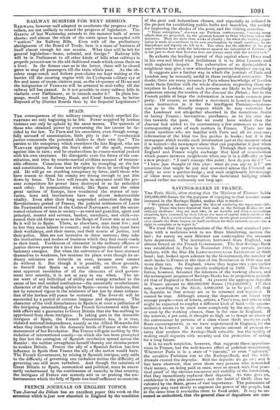SPAIN.
ME consequences of the military conspiracy which expelled Es- PARTEBO are only beginning to be felt. Power acquired by lawless violence can only be upheld by the same means. The quarrels of those who obtained power by overturning the law cannot be de- cided by the law. To Pain and his associates, even though wrong- fully accused of assassination, little pity is due : "evenhanded justice commends the poisoned chalice to their own lips." The parties to the conspiracy which overthrew the late Regent, who see NARVAEZ appropriating the lion's share of the spoil, conspire against him in turn ; and he crushes them by courts-martial packed with his own creatures. He disregards even the forms of the con- stitution, and tries by courts-martial civilians accused of treason- able offences. Conscious that he rules by trampling on the law and constitution, he dares not reinvigorate them by invoking their aid. He will go on crushing conspiracy by force, until those who have reason to dread his enmity are strong enough to put him down by force. The laws will remain in abeyance until the pre- sent competitors for power have destroyed or so far enfeebled each other. In communities which, like Spain and the other great nations of Europe, have weathered the storms of cen- turies, laws and institutions have an almost indestructible vitality. Even after their long suspended animation during the Revolutionary period of France the judicial ordinances of Lours the Fourteenth revived in the France, of NAPOLEON; and the accus- tomed relations of men in society—as ward and guardian, agent and principal, master and servant, banker, merchant, and clerk—re- sumed their old forms as soon as the Reign of Terror was at an end. So it will be in Spain. There, as elsewhere men must live ; and to live they must labour in concert ; and to do this, they must have their workshops and their marts, aud their courts of justice, and their police. Men are not inventive in these matters; they take the institutions and modes of business which they find ready-made to their hand. Feebleness of character in the ordinary officers of justice throws power for a time into the irregular channel of revo- lutionary energies. But when the subverters of law have stormed themselves to weakness, law resumes its place even though its or- dinary ministers are imbecile as ever, because men cannot do without it. But though it is possible, on these grounds, to foretell that Spain as a nation will survive the pre- sent apparent resolution of all the elements of civil govern- ment into anarchy, it is not so easy to say when. The ut- ter want of any individual of ability and energy attached to the cause of law and settled institutions—the essentially revolutionary character of all the leading spirits in Spain—seems to indicate, that not by renewed vigour in the ministers of law but by sheer exhaus- tion of the lawless will peace be restored. The fever-fit will be succeeded by a period of extreme languor and depression. The character of the civil disturbances in Spain is at once a palliation of the intriguing intermeildling of the French Government with Spa- nish affairs and a guarantee to Great Britain that she has nothing to apprehend from these intrigues. In taking part in the domestic intrigues of Spain, the French Government has it is true, violated national independence, exactly as the Allied Monarchs did when they interfered in the domestic broils of France at the com- mencement of her Revolution. But France will gain nothing by this violation of international comity—to which she has been prompted by fear lest the contagion of Spanish revolution spread across the frontier : she neither strengthens herself thereby nor obtains power to weaken Britain. France the ally of a Spanish faction has less influence in Spain than France the ally of the nation would have. The French Government, by mixing in Spanish intrigue, only adds to the difficulty of governing one turbulent nation the difficulty of governing one still more turbulent. And though the relations of Great Britain to Spain, economical and political, must be neces- sarily embarrassed by the continuance of anarchy in that country, the intrigues of France can scarcely add to or prolong the em- barrassment which the folly of Spain was itself sufficient to occasion.


























 Previous page
Previous page